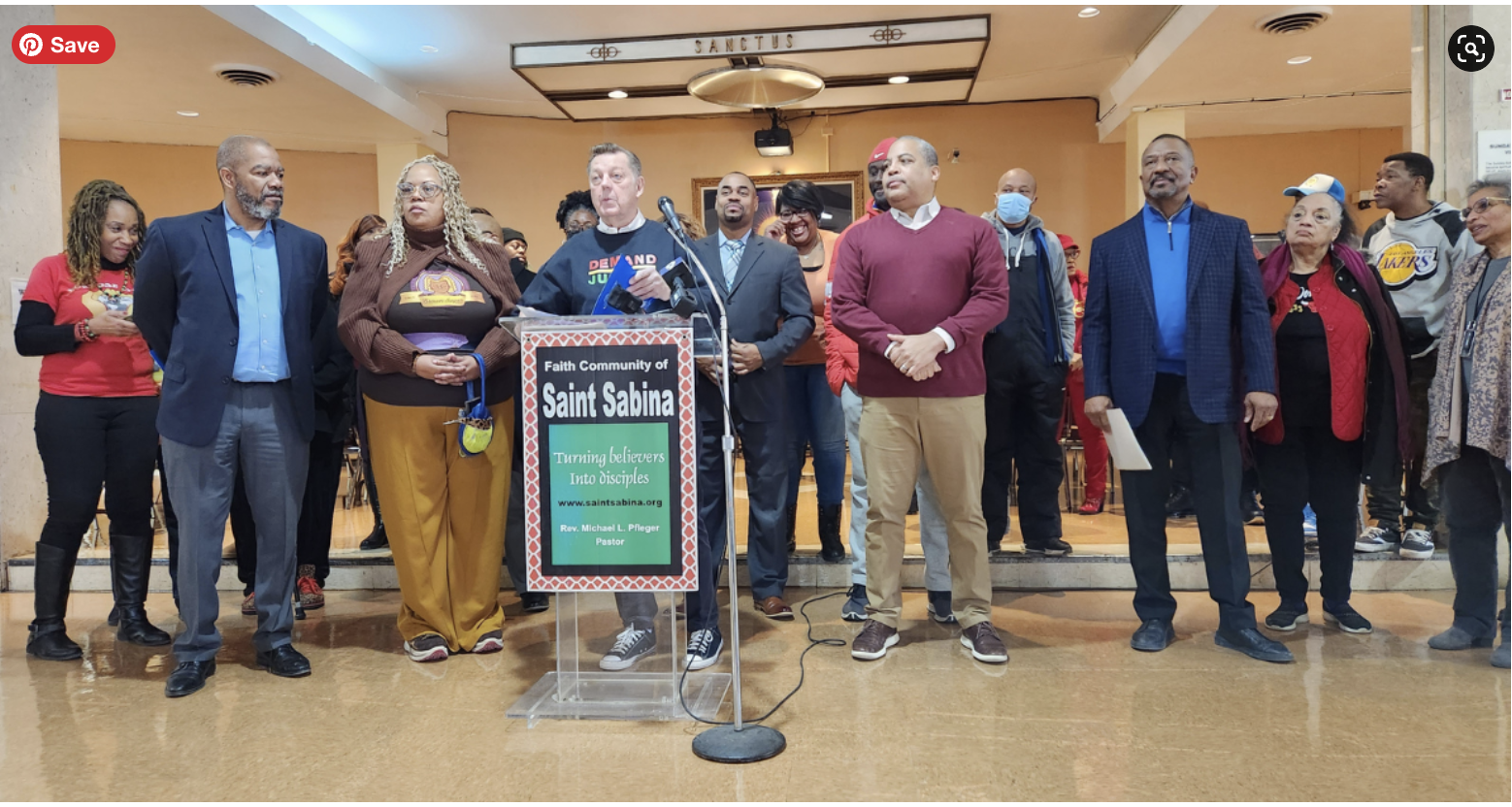
What is the best way to celebrate Black History Month? Make it. Years of social activism inspired Father Michael Pfleger of St. Sabina Catholic Church (1210 W. 78th Place) to do his part to make sure the legacy of Black excellence is more than a reflection of the past.
Chicago communities are faced with chronic and generational iniquities. Scholars and policymakers have pontificated on root causes of the plight of Chicago’s Black economy.
The Black community is not befuddled. Allies like Father Pfleger are also clear on what creates and sustains the economic divide between Black and White Chicagoans. Capital.
For every $1 of wealth accumulated by white families, Black families have one cent according to The Chicago Community Trust. Economic segregation costs the entire economy.
“I really wanted to do something this year that lasted beyond Black History Month, we’ve had great programs and events here and across the city. But what I wanted was to do something that helped right here in the community of Auburn Gresham that was economic based,” shared the faith leader.
Auburn Gresham is one of Chicago’s 77 communities located on the South Side. Key commercial corridors in the community have received investments through the leadership of the Greater Auburn-Gresham Development Corporation (GAGDC). The 25 years of vacancy of the 839 W. 79th St. property now home to The Healthy Lifestyle Hub reflects the energy and intention of local advocates to develop infrastructure while growing Black businesses.
So, when Father Pfleger reflected on celebrating Black History Month for 2023 his vision to create a legacy for the community through empowering a Black entrepreneur was met with excitement and most important, financial and business coaching resources.
“I wanted to create wealth, help a business person who has been wanting to move to the next level but has difficulties finding capital and I wanted to direct the opening of that business right here in Auburn Gresham,” shared Father Pfleger.
In 2020 a scathing WBEZ and nonprofit newsroom City Bureau report illuminated the lending inequity of mortgages underlying the wealth gap. Data from the report showed more loans for a single white community (Lincoln Park) than Black communities combined. The report also noted that “JPMorgan Chase for example lent 41 times more money in white neighborhoods than Black neighborhoods.”
The economy and lending also have not worked well for Black entrepreneurs. Jobs and revenue for cities, states, and the nation would gain with greater percentages of Black-owned businesses equal to the proportion of Black people in the country according to Brookings, a nonprofit public policy organization based in Washington, DC. The institution also published reports attesting to the disparities in capital lending for small Black businesses. It isn’t uncommon for Black entrepreneurs to begin their businesses with their own capital while still also still being fully employed.
The Shark Tank style pitch competition was not a one-off experiment but proof positive of the communities understanding that a rising tide lifts all ships. About 70 businesses and professionals donated money to the competition. The $150,000 award was also intentional to ensure the winner had adequate finances to establish and or expand their brick and mortar business. Donations ranged from $100 upwards to $50,000, “nearly half of the donors were Black businesses themselves,” said Father Pfleger.
Judges evaluated over 80 business plans resulting in three finalists having the opportunity to pitch live to the panel of esteemed judges and business people including Norman Bolden, owner of Norman’s Bistro; Montel Gayles, CEO of Business Leadership Council; Stephanie Hart, owner of Brown Sugar Bakery; Jory Luster, president of Luster Products; and Carlos Nelson, CEO of the Greater Auburn Gresham Development Corporation.
First place took home the $150,000 award with second place receiving $10,000 donated by UIC and $5,000 awarded to the third place winner.
Karen Roberts, CEO of Jus Sandwiches took home the first place award money and invaluable mentorship for opening her flagship store in Auburn Gresham. She estimates the mentorship alone is worth an additional $50-$75,000 that she is receiving.
“After Covid my orders just kept increasing and I knew I needed to have adequate space and so I had just begun planning and looking for buildings and communities that could be home for Jus Sandwiches,” said Roberts.
“A local community bank would have been ideal to be able to get a loan from and a $10,000 investment five years ago could have been transformational for my business, but banks do.
In her seven years of operation, she has participated in numerous programs to prepare her to be a successful business owner and most importantly, employer. “I’m currently part of the Bunker Labs Veterans in Residence Cohort and have taken Food Lab Chicago classes with Greater Chatham Initiative and I’m also a Sunshine Enterprise alum,” said Roberts, who is currently enrolled as a graduate student pursuing her MBA at the University of Illinois online.
She expects her business to employ at least 4 full–time and 6 part-time positions with salaries a little over minimum wage. Roberts shares she’s also part owner of FULLFEST, an event hosted at Chicago’s only Black owned nature center Eden Place in the community of Fuller Park with the goal of elevating other small Black eco-friendly businesses this July 1st.
August marks another celebration of Black owned businesses and Auburn Gresham surely hopes to cut a ribbon in late summer for the opening of Jus Sandwiches. As for the competition Father Pfleger hopes to see it grow and others across disinvested communities in Chicago model the competition to stand in the gap of banking inequity and build bridges to a financially prosperous future for Black Chicagoans.

Dr. Mila Marshall is an environmental professional and journalist with a passion for advancing sustainability in all sectors. Her passion is directed towards urban food systems in segregated cities.